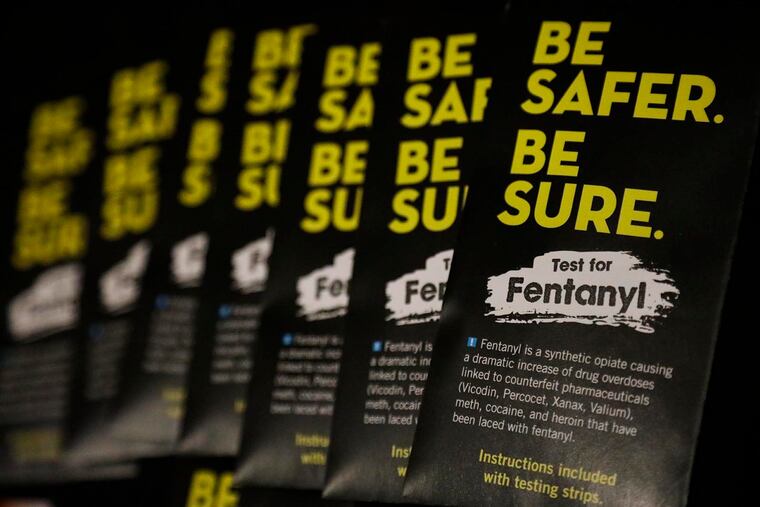Fentanyl test strips are an important tool to prevent overdose deaths
An estimated 1,250 people died of a drug overdose in Philadelphia in 2021. It is critical we use whatever tools we can to help prevent further heartbreak.

Our city continues to be hit by an unprecedented epidemic, and I don’t mean COVID-19.
Across all racial and ethnic groups, the number of drug overdose deaths exceeds the number of deaths from homicide — and this only represents a fraction of this ongoing calamity. According to data from 2020, 81% of local drug overdoses now involve fentanyl, a painkiller 100 times more powerful than morphine. It has now metastasized, showing up in samples of cocaine, counterfeit pain and anxiety medications, and many other drugs that people have no clue could contain fentanyl.
In my job as a doctor, I see a lot of people who use street drugs. Patients are anxious of the stigma they will face, making communication that much more challenging. Not all patients are interested in recovery, and not all patients are aware of how complex street drugs have become. For many years, I felt there was little I could do to help these patients or their families once they exited our doors.
That changed last fall when we began distributing fentanyl test strips in our emergency departments. Fentanyl test strips can be used to test a street drug like cocaine or heroin — or a street-purchased pain or anxiety pill — for the presence of fentanyl before using it. If the test strip indicates fentanyl is in the drug, the person can make a more informed choice about how they use. For patients, this may mean they choose to use less — or to not use the drug at all. For loved ones, this may mean assuring access to naloxone to reverse overdose or having a frank discussion about the dangers of fentanyl. In this way, we can provide people with valuable information and prevent overdoses.
» READ MORE: Exposure to fentanyl doesn’t kill but misinformation does | Opinion
Separately, I also can report that discussing fentanyl test strips in my department spurred wider discussion from our doctors and nurses about how to best provide care for people who use drugs. Talking about what we can do to keep our patients and community safe maintains the focus on solutions, rather than judgments and recriminations. By being stored and labeled openly in the department, they increased the visibility and understanding of the fentanyl crisis. I have had patients and families ask me about test strips, even when their visits had no connection to drug use.
Fentanyl test strip use leads to positive behavioral changes in patients who use drugs. Given that an estimated 1,250 people died of a drug overdose in Philadelphia in 2021, it is critical we use whatever tools we can to help prevent further heartbreak.
Fentanyl test strip use is allowed in Philadelphia because of a 2021 mayoral executive order. Recent legislation proposing making them legal statewide recently advanced out of the House Judiciary Committee after a unanimous bipartisan vote. While the emergency department is an excellent location to make these available, there is no reason we should stop there.
Last year, researchers in Philadelphia asked people who use drugs where they’d like to get fentanyl test strips. They identified the emergency department, but also said they would like to have them from sites ranging from pharmacies and post offices to SEPTA stations, shelters, and food banks.
» READ MORE: As overdose deaths rise in Philly, New York begins a lifesaving effort that we’ve so far failed to take | Editorial
Extending fentanyl test strip availability to doctors’ offices, bars, restaurants, and other public venues will help keep our community safer and better informed about this extremely dangerous situation. I join many others in the call for the ratification of the proposed legislation, followed by broad accessibility for test strips.
We’ve created a video to show how fentanyl test strips can be used in clinical settings and a demonstration video so anyone can learn how to use them. We hope more people can learn how to use this valuable resource. To get fentanyl test strips right now, you can find information for local harm reduction organizations on this city website. And if you do, make sure you get pick up some naloxone, too; in this world, you never know when you’ll be able to save a life.
Kory S. London is an emergency physician at Jefferson Health and codirector of the Jefferson Addiction Multidisciplinary Service. He designs and advocates for interventions that improve the care for patients afflicted with substance use disorders in Philadelphia.